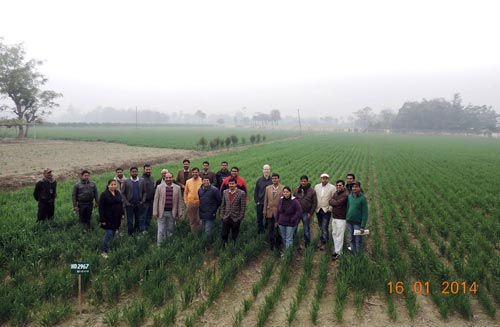By Tek Sapkota, Promil Kapoor and M.L. Jat, CIMMYT/CCAFS
The eastern Indo-Gangetic Plain in South Asia is one of the world’s most vulnerable regions to climate change. As part of propoor climate change mitigation work – which focuses on poverty reduction – under the CGIAR Research Program on Climate Change, Agriculture and Food Security (CCAFS), CIMMYT is actively working on adaptation, risk management and quantifying the mitigation potential of traditional and resilient management practices in smallholder systems in the region.

CIMMYT, in close collaboration with India’s national agricultural research system, manages extensive research on the quantification of climate change mitigation potential for precision-conservation agriculture-based cereal systems in South Asia. CIMMYT scientists and collaborators are working on the quantification of greenhouse gases (GHGs) under different scenarios and gathered for a twoday social learning workshop on standardizing related protocols. Attendees from CIMMYT and the Borlaug Institute for South Asia (BISA), along with participants from the International Water Management Institute (IWMI), Indian Agricultural Research Institute (IARI), the national research system and two students from the Climate Food and Farming Network (CLIFF), gathered in Pusa, Samastipur, Bihar, during 15-16 January.
Participants shared experiences on GHG mitigation under contrasting production systems and ecologies and took stock of ongoing mitigation work at the Delhi, Karnal and Pusa sites. The event provided an opportunity to discuss different approaches for GHG quantification approaches. Quantification suitable for smallholder production systems in developing countries were presented by Tek Sapkota, CIMMYT mitigation agronomist. Scientists from Karnal, New Delhi and Pusa presented the current status of GHG measurement work and work plans for 2014. The results from these regional laboratories will be used for larger-scale studies, spanning all levels, from plot to landscape.
As part of its ongoing mitigation work, CIMMYT is measuring GHG emissions in six agronomic trials representing various cropping, tillage, residue and nutrient management systems in Karnal, New Delhi and Pusa, three different agro-ecologies of the Indo- Gangetic Plain. CIMMYT actively collaborates with universities, national research institutes and international organizations like BISA on its mitigation work and capacity building, including developing a new generation of researchers. Attendees also discussed the importance of setting professional and personal goals and priorities, effective time management, effective communication and delegating tasks. They shared perceptions and ideas on mitigation activities and what changes are necessary to strengthen mitigation work. CIMMYT-CCAFS South Asia Coordinator M.L. Jat emphasized the need to move beyond plot level to quantify mitigation potential at the landscape, regional and national levels. Attendees also discussed and agreed to use tools ranging from measurement to estimation.
The meeting concluded with the development of a 2014 roadmap for mitigation activities. Participants also visited the BISA farm and CCAFS climate-smart villages (CSVs) in the Vaishali district of Bihar to learn smallholders’ perceptions about climate change.
 Capacity development
Capacity development 
